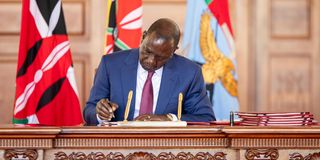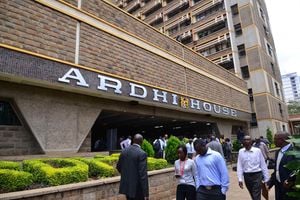
President William Ruto.
The State Departments for Energy and Basic Education are among the biggest casualties after President William Ruto signed into law the Supplementary Appropriation Bill 2024 that reduced allocation for the 2024/25 financial year by Sh145 billion.
But even as the government reduced its expenditure plans, it safeguarded “key” expenditures to reform the sectors of agriculture, education and health including promoting universal health coverage (UHC) and improving the terms and conditions of police officers.
Also benefitting are the Junior Secondary School (JSS) interns who will now be absorbed into permanent and pensionable terms, capitation for JSS students including those transitioning to grade nine, and university funding.
In the current financial year- 2024/25, the government had planned to spend Sh3.9 trillion against a revenue projection of Sh2.92 trillion with a deficit of Sh597 billion to be plugged by local and foreign borrowing.
However, President William Ruto’s rejection of Finance Bill 2024 following a spate of deadly protests that led to deaths and injuries as Kenyans opposed the punitive taxation regime proposed by the Bill, the government was left with no option but to rationalize its expenditure plans.
The rejected Finance Bill projected the collection of Sh346 billion on top of the Sh2.92 trillion in ordinary revenue and Appropriation in Aid (AiA) to finance this year’s budget.
With the Supplementary Appropriation Act, the budget that had been allocated to the State Department for Energy and Basic Education was reduced by a cumulative Sh26.7 billion which will affect critical projects.
The State Department for Energy lost Sh15.6 billion from the Sh69.7 that had been allocated with the State Department for Basic Education losing Sh11.1 billion from the Sh142.3 billion budget.
The Act has also scrapped the Sh1.2 billion that had been allocated to the offices of the first lady and spouse of the deputy president.
Despite the legality of the two offices in question, the office of the first lady had been allocated Sh696.65 million with the office of the spouse of the DP getting Sh557.6 million in the budget approved by the National Assembly in June 2024.
A brief from the State House on Monday after the Bill was signed into law noted that the reorganized budget will create a balance by reducing recurrent expenditure while safeguarding critical essential expenditure in the agriculture, health and education sectors among others.
“While it could be prudent to reduce expenditures by the amount equivalent to the anticipated revenue shortfall, this was not tenable given the delicate balance between austerity measures and cushioning the livelihoods of the people and the economy,” the State House brief read.
The financing of the Sh3.99 trillion budget approved by the National Assembly in June this year was based on the existing revenue collection coupled with enhanced measures anticipated in the Finance Bill 2024.
It was expected that this would actualize fiscal consolidation efforts by reducing the fiscal deficit as a share of GDP from 5.6 percent in the 2023/24 fiscal period to 3.3 percent in 2024/25 period.
The approved estimates were based on the assumption that the projected ordinary revenue collection for the 2024/25 financial year would amount to Sh2.92 trillion, compared to Sh2.46 trillion in the 2023/24 period.
However, the Budget and Appropriations Committee (BAC) chaired by Kiharu MP Ndindi Nyoro, underscored the fact that the actual revenue collection for the 2023/24 financial year underperformed by over Sh280 billion.
“Considering these factors, it is unlikely that the projected revenue collection for the 2024/25 fiscal period will be realized,” the committee says in the report that formed the basis for the preparation of the Supplementary Appropriation Bill 2024.
The reorganized budget provides a downward revision of the ordinary revenue collection target for the 2024/25 financial year by Sh285.8 billion, about 9.8 percent, from Sh3.34 trillion to Sh3.06 trillion.
The Sh285.8 billion reduction in revenue includes Sh104 billion in excise taxes, Sh64 billion in domestic VAT, Sh49.5 billion in income tax, Sh24 billion in VAT on imposed goods and services and Sh27 billion in import duty collection.
The reduction in expected revenue collection exceeds the reduction in expenditures by Sh164 billion.
This means that the fiscal deficit as a share of GDP for 2024/25 is expected to expand from Sh597 billion as approved in the budget passed in June this year, which is 3.3 percent, to Sh761 billion, about 4.2 percent.
It is also projected that the expanded fiscal deficit will be financed by increasing domestic borrowing by Sh141.4 billion from Sh263.2 billion to Sh404.6 billion.
Of the reduced budget amounts, Sh40 billion is from recurrent expenditure and Sh105 billion from development spending.
This means that the executive budget is reduced by Sh139.8 billion drawn from various government Ministries Departments and Agencies (MDAs) Sh3.7 billion from the parliament budget and Sh2.1 billion from the judiciary.
The allocation to the State House and Office of the Deputy President was reduced by Sh6 billion, the National Treasury by Sh7 billion, various development projects under medical services by Sh6.9 billion and road projects and transport sectors by Sh17.3 billion.
In safeguarding “critical” expenditures under the agriculture sector, Sh20 billion has been allocated to directly support farmers to enhance production and productivity.
This includes Sh7.5 billion for the fertilizer subsidy programme, Sh3 billion for the Coffee Cherry Fund, Sh2 billion to waive coffee farmers' debts, Sh2 billion for the purchase of milk coolers, Sh1.5 billion for milk price stabilization and Sh700 million to support sugar farmers.
The funding of education sector reforms includes Sh18.7 billion for confirmation of all Junior Secondary School (JSS) interns into permanent and pensionable terms and Sh30.7 billion for capitation for JSS students including those transitioning to grade nine.
The others are Sh23 billion to universities for the Differentiated Unit Cost (DUC) funding model, Sh31.3 billion to the Higher Education Loans Board (HELB) for scholarships and loans and Sh17 billion to the University Funding Board (UFB) for scholarships to university students.
The funding under the health sector reforms and promoting UHC includes Sh3.7 billion for the medical internship program, Sh4 billion for the primary healthcare fund, Sh4 billion for contracted UHC healthcare workers and Sh4.5 billion for Community Health Volunteers (CHV) allowances and equipment.
To improve the terms and conditions of the police officers, Sh3.5 billion has been allocated for the enhancement of remuneration for the officers in line with the recommendations of the report of the national taskforce on police reforms.
“This is to promote the dignity and living standards of the officers in the security sector,” the State House Brief reads.
The law has also cushioned the government’s school feeding plan in public primary institutions with the allocation of Sh1.8 billion.
The programme has, however, been moved from the State Department of Basic Education to the State Department of Arid and Semi-Arid Lands (ASALs).
The other losers include the Teachers Service Commission (TSC) which has Sh10.33 billion slashed from its Sh358.22 billion budget allocated in the current period and State Department for Internal Security and National Administration's Sh35.9 billion budget reduced by Sh7.8 billion.
The National Treasury has its budget cut by Sh13.45 billion from the current Sh135.12 billion, State Department for Medical Services Sh6.99 billion cut from its Sh98.98 billion allocated and Lands and Physical Planning lost Sh4 billion from its Sh10 billion budget.
The State Department for Higher Education lost Sh4.99 billion from Sh125.4 billion, State Department for Transport Sh3.3 billion from Sh51.6 billion, the State Department for Technical Vocational Training (TVET) Sh30.7 billion budget reducing by Sh2.5 billion
The Housing and Urban Development State Department has also seen its Sh87.6 billion budget slashed by Sh2.1 billion with State Department for Water and Sanitation’s Sh52.41 billion budget reduced by Sh2.72 billion.










